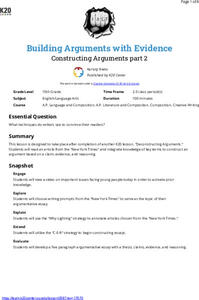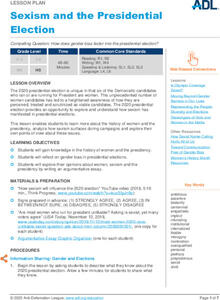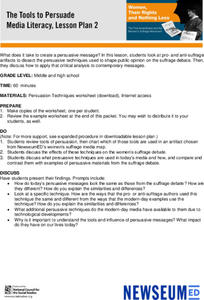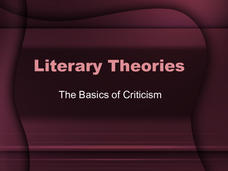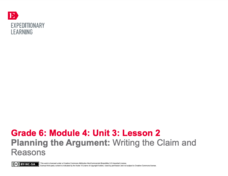K20 LEARN
Ancient Philosophy: Greeks or Romans?
While often not recognized, the ideas of ancient Greek and Roman philosophers still echo today. Using a series of videos and graphic organizers, individuals explore how ancient Greeks and Romans have influenced current Western political...
K20 LEARN
Trigger Warnings - Intellectual Rights and Responsibilities: Banned Books, Censorship Part 1
"Warning: Conducting this lesson may be harmful." Such statements, called "Trigger Warnings," are the focus of a two-part lesson that looks at censorship, especially the pros and cons of trigger warnings. Class members read two articles,...
Curated OER
Putting it Together: Analyzing and Producing Persuasive Text
Young orators demonstrate what they have learned about persuasion and persuasive devices throughout the unit by analyzing a persuasive speech and then crafting their persuasive essays. Class members engage in a role-play exercise, use...
K20 LEARN
Writing Is Elementary, My Dear Watson: Writing Paragraphs With Evidence And Reasoning
Did Smitty do it, or is he a victim? Sleuths apply their observation and reasoning skills to build a case for an argumentative paragraph. Class members closely observe a cartoon, make a claim, cite evidence from the image, and support...
K20 LEARN
Writing Wrongs Mini Lesson: Peer Editing And Revising
High schoolers draft a paragraph about their stance on the issue of school uniforms and share their work with a peer for editing. After watching a parody video about peer editing and revising, class members generate a "Top 10 list" of...
K20 LEARN
Lord of the Flies Unit, Lesson 7: Good To Be Bad
The seventh lesson in the Lord of the Flies unit asks scholars to consider whether or not an individual can overcome the worst thing they have ever done. Groups read different articles related to the question, share their expertise in a...
Anti-Defamation League
Bias, Bullying and Bad Behavior in the NFL
A 2014 case of locker room behavior in the National Football League offers high schoolers an opportunity to get involved in the conversation of bullying and abuse. Class members read about the case and analyze quotes that reveal...
K20 LEARN
Ichabod and Brom - Two Wild And Crazy Guys: Characters' Differing Perspectives
After reading Washington Irving's "The Legend of Sleepy Hollow," class members compare the characteristics of Ichabod Crane and Brom Van Brunt. Next, they read an article about ghosts that supposedly haunt the campus of Oklahoma...
K20 LEARN
Friends, Romans, Countrymen, Lend Me Your Emotions: Julius Caesar
Scholars, high schoolers, class members! With the help of this lesson, you too can identify the three persuasive appeals (ethos, pathos, and logos) the characters in William Shakespeare's tragedy Julius Caesar used to convince their...
K20 LEARN
Building Arguments With Evidence: Constructing Arguments Part 2
The second session in the two-part "Building Arguments with Evidence" lesson asks scholars to craft an argument essay on a topic of interest to them. Writers establish a claim, locate evidence, and justify their stance.
K20 LEARN
Arguing With Evidence: Deconstructing Arguments Part 1
In the first lesson in a two-part series, high schoolers pick a social issue important to them and examine an article about the topic, the arguments and evidence used to support the writer's stance, and craft two counter-arguments to the...
ReadWriteThink
Persuasive Essay: Environmental Issues
Young environmentalists learn how to craft a persuasive essay about an environmental issue they consider important. After studying the components of a persuasive essay and examining a student model, writers brainstorm possible topics and...
Smithsonian Institution
The Suffragist: Educator's Guide for Classroom Video
Class members take on the role of historical investigators to determine why it took 40 years for women in the United States to get the right to vote. Sleuths view videos and analyze primary sources and images to gather evidence to answer...
Anti-Defamation League
Sexism and the Presidential Election
Young historians investigate how sexism impacted the 2020 United States presidential election. They examine media coverage of the six women candidates, engage in a four-corners debate reacting to statements about gender and the...
Newseum
The Women Who Made the Movement
Granting women the right to vote was a long time coming and took many efforts. Young historians select one woman involved in the suffrage movement to research. They compare and contrast the depictions of their subject in mainstream and...
Newseum
Battle for the Bill of Rights: Ultimate Survivor Amendment Game
To understand the importance of the wording of the articles of the First Amendment (freedom of religion, freedom of speech and the press, and freedom to assembly and petition), teams argue before a jury for draft amendments of one...
Newseum
Weighing the Arguments
To understand how personal perspectives can affect policy and politics, scholars examine the woman suffrage media map and historical artifacts to analyze arguments for and against women's suffrage. Class members then take on the role of...
Newseum
The Tools to Persuade
After reviewing persuasion techniques, young historians examine how a specific technique was used in the pro- or anti-suffrage messages. They then examine how that same technique is used in modern-day media messages.
Livaudais-Baker English Classroom
Literary Theories
Introduce ELA scholars to the basics of literary criticism with a 41-slide presentation that identifies eight different approaches to critical analysis. Each approach is defined, and advantages and disadvantages are listed. Also included...
Workforce Solutions
Workforce Solutions 4-5 Lessons
Four lessons focus on job opportunities in Texas. In the first lesson, scholars examine the geography of Texas in preparation for analyzing data that showcases the economy of different regions. Lesson three challenges pupils to research...
Health Smart Virginia
Mental Health/Social Emotional Skills
Looking for social-emotional resources? Check out this seven-page packet that includes activity and lesson ideas, as well as links to information resources that support the social and emotional development of tenth graders.
Academy of American Poets
Poems about Poetry
Learners of all ages hear the words “Today we’re going to start poetry” and begin their plans to drop out of school. It is not the teacher's fault! Use this resource to help young scholars understand the genre of poetry and why it is...
Nemours KidsHealth
Online Safety: Grades 6-8
Recognize risky behaviors and avoid them! That's the big idea behind two activities designed to teach middle schoolers to think critically about online safety. After reading background articles about protecting online identity,...
EngageNY
Planning the Argument: Writing the Claim and Reasons
Step up! Using the resource, scholars discover the six steps to writing an effective position paper. Next, they work on a graphic organizer to begin planning their argument-based essays.











